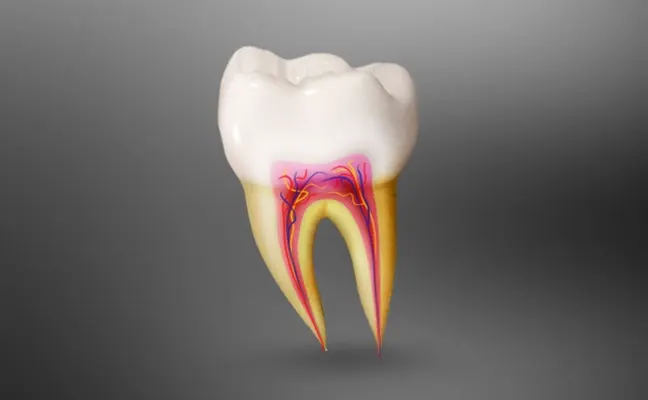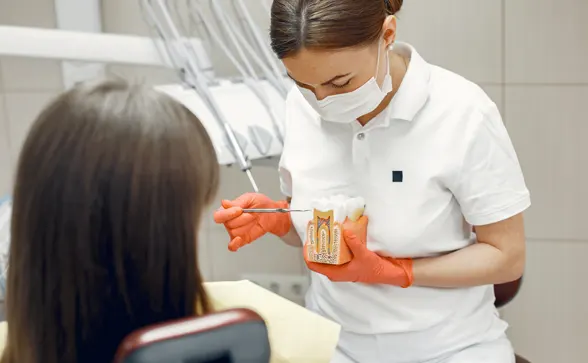Root Canal in Grand Prairie

Root Canals Treatment in Grand Prairie
Are you experiencing severe tooth pain or noticing signs like gum pimples, swelling, discoloration, chipped teeth, or extreme sensitivity? These could be indicators that you need a root canal in Grand Prairie, a vital procedure to address infected teeth and prevent further damage.
A root canal involves a thorough process. Our expert dentists ensure your comfort through anesthesia, followed by the removal of infected pulp, application of antibiotics, and thorough filling. This step-by-step breakdown ensures the preservation of your natural tooth while addressing the infection.
Signs and Symptoms – When to Consider a Root Canal in Grand Prairie?

Root Canals Treatment in Grand Prairie
-
Preservation of Natural Tooth: Root canal treatment allows you to keep your natural tooth, maintaining its functionality and appearance.
-
Long-Term Oral Health: Preserving the natural tooth through a root canal contributes to better long-term oral health compared to extraction.
-
Prevention of Jawbone Deterioration: Unlike extraction, a root canal helps prevent the deterioration of the jawbone associated with missing teeth.
-
Maintains Facial Structure: By preserving the natural tooth, a root canal helps in maintaining the natural structure of your face.
-
Avoids Shifting of Adjacent Teeth: Retaining the natural tooth prevents neighboring teeth from shifting, maintaining overall dental alignment.
-
No Gaps in Your Smile: A root canal ensures there are no gaps in your smile, providing both aesthetic and functional benefits.
-
Efficient Chewing Function: Restores full chewing function, allowing you to enjoy a varied and comfortable diet.
-
Avoids Replacement Costs: Choosing a root canal eliminates the need for expensive tooth replacement options like dental implants or dental bridges.
-
Less Invasive Treatment: Root canal treatment is a less invasive procedure compared to tooth extraction and replacement alternatives.
-
Preserves Natural Appearance: Maintains the natural look of your smile, avoiding the cosmetic changes associated with missing teeth, and explore additional enhancements through cosmetic dentistry.
When considering your dental treatment options, the benefits of a root canal in Grand Prairie make it a favorable choice for preserving your natural teeth and ensuring optimal oral health.
Procedure for Root Canal in Grand Prairie:
-
Initial Consultation:
- The dentist assesses the patient's oral health through examinations and X-rays.
- Discusses symptoms and medical history to determine the need for a root canal.
-
Anesthesia Administration:
- Local anesthesia is applied near the affected tooth to numb the area, ensuring a pain-free procedure.
-
Tooth Isolation:
- A dental dam is placed around the tooth to keep it clean and dry during the procedure.
-
Access Opening:
- The dentist creates a small opening in the tooth's crown to access the infected pulp.
-
Pulp Removal:
- Using specialized tools, the infected or damaged pulp is carefully removed from the tooth.
-
Cleaning and Shaping:
- The interior of the tooth is cleaned, shaped, and disinfected to eliminate any remaining bacteria.
-
Filling the Root Canals:
- The cleaned space is filled with a biocompatible material called gutta-percha to seal the root canals.
-
Temporary Filling:
- A temporary filling is placed to protect the tooth until a permanent restoration is applied.
-
Antibiotics (if necessary):
- In some cases, topical or oral antibiotics are applied to prevent infection.
-
Final Restoration:
- A permanent restoration, such as a dental crown, is placed to protect and strengthen the treated tooth.
-
Follow-up:
- Patients may be scheduled for a follow-up visit to ensure proper healing and the success of the root canal..
Post-Care Instructions for Root Canal Recovery:
-
Pain Management: Take prescribed or over-the-counter painkillers as directed by your dentist to alleviate discomfort.
-
Soft Diet: Stick to soft foods initially to avoid putting pressure on the treated tooth and minimize jaw or mouth pain.
-
Gentle Oral Hygiene: Brush your teeth gently and floss carefully, especially around the treated tooth, to avoid irritation.
-
Prevent Infection: Maintain good dental hygiene to prevent immediate reinfection. Follow your dentist's recommendations for oral care routines.
-
Follow-up Appointments: Attend scheduled follow-up appointments with your dentist for proper monitoring and any necessary adjustments.
After a root canal in Grand Prairie, managing pain and following post-care instructions is crucial. Stick to soft foods, maintain gentle oral hygiene, and take steps to prevent reinfection. These measures contribute to a smooth and comfortable recovery.
Root Canal vs. Alternative Treatments:
Root Canal:
-
Preserves Natural Tooth: Retains the original tooth, preventing the need for extraction.
-
Long-Term Oral Health: Contributes to sustained oral health by maintaining the natural tooth structure.
-
Less Invasive: Typically less invasive than alternatives like tooth extraction.
Tooth Extraction:
-
Loss of Natural Tooth: Involves removing the affected tooth, leading to a gap in the dental arch.
-
Recovery Time: Longer recovery time compared to a root canal.
-
Replacement Needed: Often requires additional dental work, such as dental implants or bridges for tooth replacement.
Bridge or Denture:
-
Partial Restoration: Provides a partial restoration, addressing the gap but not preserving the natural tooth.
-
Maintenance Required: Requires maintenance and periodic adjustments.
-
Potential Discomfort: May cause discomfort or difficulties in speaking and eating.
Understanding the differences aids informed decisions about oral health. Comparing a root canal in Grand Prairie with alternatives like tooth extraction highlights its benefits, preserving natural teeth and ensuring lasting oral health. Consider these advantages when weighing treatment options for your specific dental needs.
Ideal Candidates for Root Canal Treatment:
Individuals with healthy gums, teeth, and good oral hygiene practices are ideal candidates for a root canal in Grand Prairie. This procedure is tailored to those seeking a long-term solution to infected teeth while maintaining overall dental wellness.
Why Choose Fresh Family Dental for Your Root Canal in Grand Prairie?
Experience top-tier root canal treatment in Grand Prairie at Fresh Family Dental. Our skilled team prioritizes your comfort and oral health, offering advanced procedures tailored to your needs. With cutting-edge technology and a commitment to excellence, we ensure a pain-free and efficient root canal experience. Choose our practice for personalized care, preserving your natural teeth and ensuring a healthy, confident smile.
Get the Best Root Canal in Grand Prairie:
Ready to experience the best root canal in Grand Prairie? Schedule an appointment with Fresh Family Dental for precise and comfortable root canal treatments. Call us today at (972) 544-5552 or visit us in Grand Prairie, TX.
We also offer a comprehensive range of dental treatments, including dental crowns, implant dentures, emergency dentistry, Invisalign aligners, preventive treatment, teeth whitening, and more.
Choosing a root canal in Grand Prairie ensures you not only address dental issues effectively but also preserve your natural smile for years to come. Trust Fresh Family Dental for exceptional root canal treatments tailored to your unique needs.
FAQs About Root Canals in Grand Prairie, TX:
A root canal removes infected or damaged pulp while preserving your tooth structure. As explained in "Top 7 Benefits of Root Canal Treatment," this procedure eliminates pain, prevents the spread of infection, and strengthens the tooth with a protective crown, allowing you to maintain your natural smile for years.
Root canal treatment is a procedure designed to save an infected or damaged tooth. The process includes:
- Examination: X-rays and evaluation to assess the extent of infection.
- Anesthesia: Local anesthesia is applied to ensure comfort throughout the procedure.
- Cleaning: The infected pulp is removed, and the root canals are thoroughly cleaned and disinfected.
- Sealing: The canals are filled with a biocompatible material to prevent reinfection.
- Restoration: A dental crown is placed to protect and restore the tooth’s strength and functionality.
This procedure helps preserve your natural tooth, alleviates pain, and prevents the need for tooth extraction.
A root canal is necessary when the tooth's pulp becomes infected or damaged due to deep decay, injury, or infection. If untreated, it can cause severe pain, abscesses, or tooth loss. The procedure removes the infected pulp, relieving pain and preserving the tooth’s function, ensuring long-term oral health.
Look for persistent toothache, hot/cold sensitivity, gum/facial swelling, gum boil/pimple, tooth discoloration, painful biting, or a foul taste/odor near a tooth. Visit our blog 7 Symptoms You Need a Root Canal ASAP for more details.
Yes, there are process differences based on age. Root canals for children involve treating primary teeth, while for older adults, it's generally permanent teeth. For more detailed information on this topic, you can visit our blog page: Root Canals in Grand Prairie: Process Differences for Children and Older Adults.
The duration of a root canal procedure can vary based on factors like tooth location, complexity, and dentist's experience. Typically, a straightforward root canal takes around 1 to 2 hours. For a detailed insight into the procedure duration, check out our guide: How Long Does the Root Canals Procedure Take?
Absolutely. Complex cases, like molars with intricate root canals or severe infections, could require more time. Your dentist will provide a personalized estimate based on your specific situation.
In many cases, yes. Yet, more extensive procedures or additional treatments, such as crown placement, might necessitate multiple visits for optimal results.
- Follow dentist's medication instructions.
- Avoid using treated tooth for chewing until restored.
- Maintain oral hygiene: brush and floss regularly.
- Minimize sensitivity: avoid hot/cold foods.
- Schedule follow-up for permanent restoration.
For more detailed information on how to care for your tooth after a root canal, you can read our comprehensive guide, "Root Canals Rejuvenated: Expert Tips for Post-Treatment Tooth Care." Our guide provides valuable insights and recommendations for proper care and healing.
Care for your tooth after a root canal for a healthy recovery and a vibrant smile. Contact Fresh Family Dental at (972) 544-5552 for guidance and care.
Common signs that indicate the need for a root canal include persistent tooth pain, sensitivity to hot and cold, swelling or tenderness around the tooth, and discoloration of the tooth. A dentist will assess your condition and determine if a root canal is necessary.
After a root canal, the tooth may be temporarily filled or covered with a temporary crown. A follow-up appointment will be scheduled to place a permanent filling or crown to restore the tooth's strength and functionality.
In cases where a root canal cannot save the tooth, extraction may be the only alternative. However, it's generally recommended to save the natural tooth whenever possible to maintain proper chewing function and preserve the surrounding bone structure.

4.9 Stars
based on 426 reviews
5 Stars
based on 13 reviews